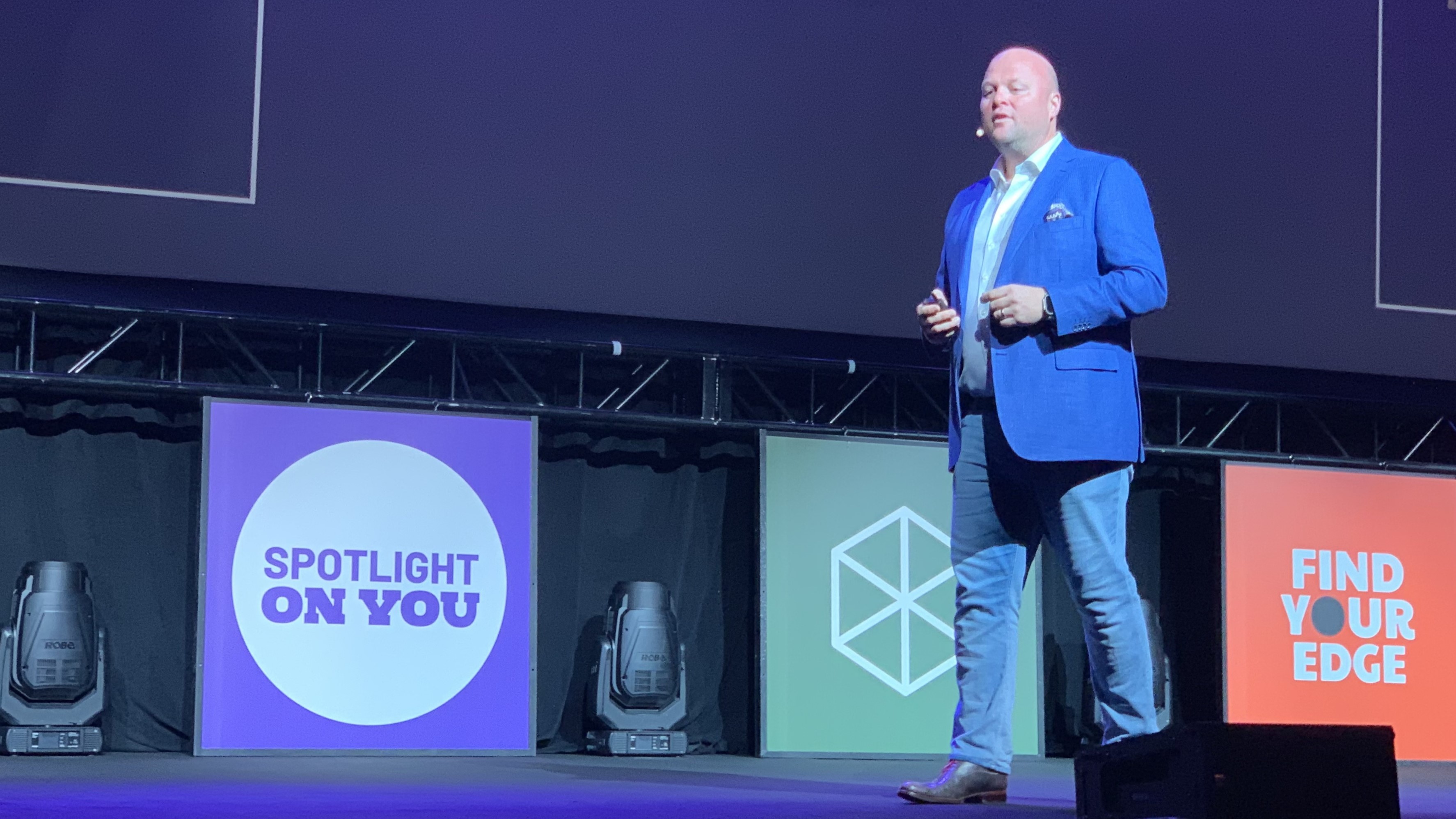Question: What do you call the best team in baseball when it’s off its A-game for a night? Answer: The best team in baseball.
So what do you call the best conference in legal tech when it is off its A-game for a year? The best conference in legal tech.
Monday and Tuesday this week brought the 10th annual Clio Cloud Conference. It was the first live ClioCon since COVID and the first to be held in Nashville, after previous years in San Diego, New Orleans and Chicago.
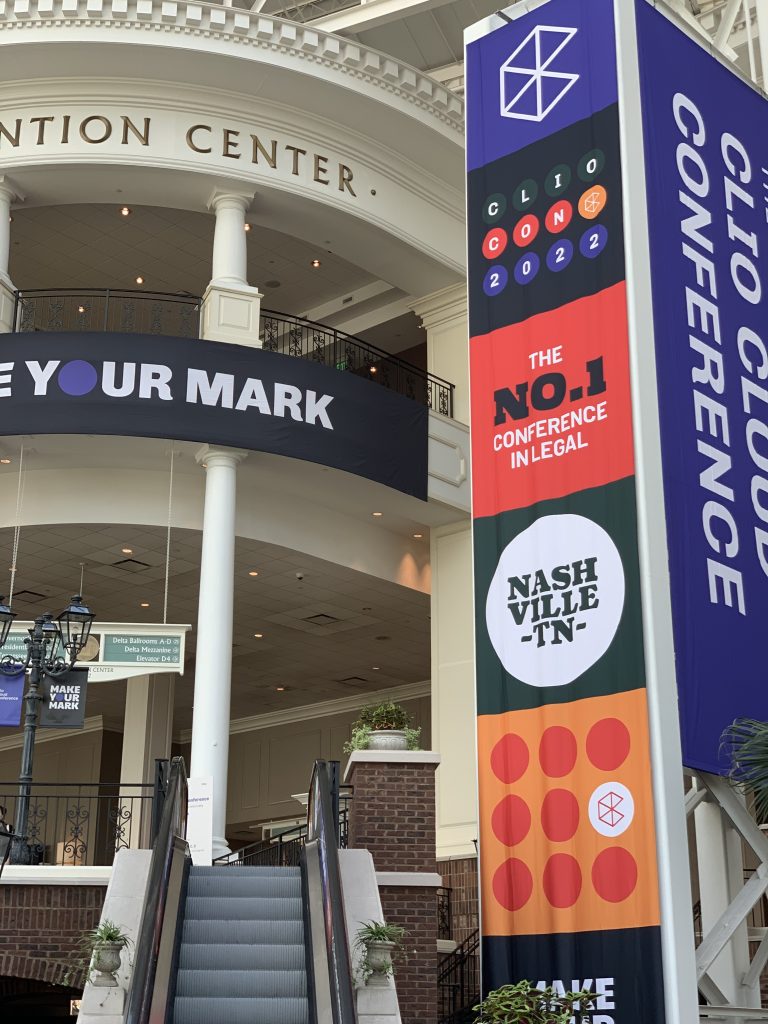 Having been to all 10 ClioCons, I was thrilled to return in person. But when the two days were over, I left feeling that this year’s conference was a bit off the A-game I had come to expect.
Having been to all 10 ClioCons, I was thrilled to return in person. But when the two days were over, I left feeling that this year’s conference was a bit off the A-game I had come to expect.
Had it been only me that felt that way, I probably would not write it. I probably would have attributed my opinion to my own mood or misperception and kept it to myself.
But it was not only me. I heard it from many others – others who had attended past ClioCons and who are people whose opinions I value and respect – that this year’s conference somehow lacked the same vibe that has defined the conference since its inception.
I went to the conference as a reporter, and as a reporter, I would be irresponsible to write only about the good and turn a blind eye to the not-so-good. So in this post-mortem report, I will speak to both.
But let’s start with what makes this conference so great.
A Must-Attend Conference
I have been an unwavering and unabashed fan of ClioCon since its start in 2013. After the second one in 2014, I called it one of the best legal technology conferences I had ever been to. After the 2015 conference, I said that it was déjà vu all over again. I felt the same in 2016, 2017 and 2018, writing that it had “cemented its standing as a must-attend legal technology conference.” After the 2019 ClioCon, I described the experience as like “a cult of innovation.”
This year gave me no reason to waiver from my fandom. I still think this is one of the best legal technology conferences out there, if not the best, and I still think it is a must-attend conference for anyone interested in innovating the practice of law. Run out and get your tickets now for next year, where it will again be in Nashville. (There is an early bird price through Jan. 19 of $399.)
Here again, I am not alone. In fact, as a group of us ClioCon veterans chatted over drinks on the last night of the conference, and even though everyone in the group agreed that this year felt somehow off, all but one said that ClioCon remains their favorite legal tech conference and that they unequivocally planned to be back next year. (The one holdout was on the fence as to which is best, ClioCon or the Legalgeek conference in London.)
So what made this conference great? Here are some of the highlights.
The tribe. In his closing remarks wrapping up this year’s ClioCon, Clio founder and CEO Jack Newton described the feeling among attendees of having “joined a tribe.” “We are part of a big community here with a common goal of transforming the legal experience for all,” he said. Tribe is perhaps a better word than my “cult,” but I think Newton and I mean the same thing.
It is no exaggeration to say that this is a conference in which it feels as if every single person is there because they are deeply committed to improving the practice of law and the delivery of legal services through the better use of technology and the innovation of their practices. These are legal professionals who care deeply about their clients and who want passionately to be the best they can at serving them. At no other legal tech conference will you find this breadth and depth of passion.
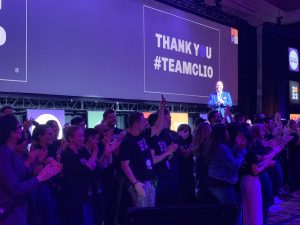 The Clions. Clio sent some 200 of its employees to the conference, not as idle attendees or to be salespeople or marketers, but rather to be, in effect, concierges. Wherever one turns at the conference, there is a Clio employee ready to help, whether you simply need to be pointed in the right direction or help with some other question. I know of no other conference where the organizers go to such expense to ensure that attendees are never without assistance or guidance – or, for that matter, a friendly smile.
The Clions. Clio sent some 200 of its employees to the conference, not as idle attendees or to be salespeople or marketers, but rather to be, in effect, concierges. Wherever one turns at the conference, there is a Clio employee ready to help, whether you simply need to be pointed in the right direction or help with some other question. I know of no other conference where the organizers go to such expense to ensure that attendees are never without assistance or guidance – or, for that matter, a friendly smile.
The programs. ClioCon continues to do a good job of presenting programs on topics that focus on the practical aspects of running and growing a law firm and using legal technology.
Exhibit hall. This is how an exhibit hall should be done. Every exhibitor gets the same booth. They stand or fall on the strength of their product, not on the gaudiness of their display. The hall includes multiple other activities to draw attendees in and through. Breakfast and lunch were served daily in the back. Exhibitors told me that they got great traffic to their booths and many leads for potential customers.
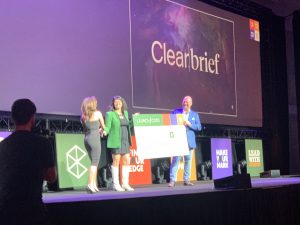
Founder Jacqueline Schafer celebrates Clearbrief’s Launch//Code win.
Launch//Code. Clio’s $100,000 competition honors the best app integrations. This year, Clio broke the award into two $50,000 checks, one for best new app and the other for most-improved.
The winner of the best new app was Clearbrief. Honors for most improved went to Legalboards.
Fun. ClioCon does a great job of weaving fun activities into the fabric of the day. This year, that included line-dancing classes every day at noon, pop-up networking events, sunrise yoga, an area for playing corn hole, and a western apparel shop, among other things.
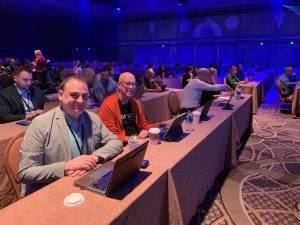
The ‘press gallery’: Joe Patrice of Above the Law and Steve Embry of Techlaw Crossroads.
Media savvy. There may be no more media savvy legal tech conference than ClioCon. Some conferences deal with the media as a chore, or even as the enemy. ClioCon welcomes the media in every way imaginable, from the materials it provides in advance of the conference to the assistance it gives on site. A highlight this year, as it was in San Diego, is the area set aside for podcasting, where different podcasts each get their own table where they can set up and record at will.
(A particular shout out goes to Pamela Smith, senior manager, corporate communications, at Clio, who is a consummate PR professional and who is constantly on top of every detail a reporter might need.)
So What Was Off?
Not only have I been a fan of this conference since its start, but I have also over the years come to know and be friends with many of the people who work at Clio. That extends right to the top, to CEO Newton, whom I sincerely believe to be one of the leading visionaries in law and who has been and continues to be a driving force in moving the legal profession and the legal tech industry to the next level.
Given that, I very much wish I had nothing but praise to heap on this year’s conference, as I have on past years’ ClioCons. But having heard from so many of the attendees I spoke to — particularly those who had been at past ClioCons and who are people whose opinions I trust and value — the same sentiment that something was amiss, it is the elephant in the room.
Even so, the challenge in writing about this is that those very same people had trouble putting their fingers on what it was that seemed amiss. Some talked about a different vibe. Others pointed to more tangible issues.
So what was it? Here are some possible candidates.
The Pandemic
I might start with pointing a finger at COVID. Look, all of us are a bit rusty in our social skills. We are all a bit out of practice doing anything that involves gathering with other people in social situations. If that is true for smaller gatherings, then it is true in many multiples for massive gatherings. Perhaps it was fitting, then, that one keynote speaker was Priya Parker, author of The Art of the Gathering: How We Meet and Why It Matters. We are all relearning how to gather.
The Venue
In my conversations with people about the conference, there was one point on which virtually all of them agreed: It was difficult to separate their gut feeling about the conference from their disfavor for the venue. The question, then, is: To what extent did their distaste for the venue taint their impression of the conference?

Architect’s rendering of the Gaylord.
The venue, the Gaylord Opryland Resort and Convention Center, is a sprawling, byzantine facility that appears to have been designed by a team inspired by the drawings of graphic artist MC Escher, with a confounding array of multi-level crisscrossing walkways, soaring plant-filled atriums, escalators that lead to stairways, and an overall layout that had people often feeling lost.
With its water park and indoor boat tours, the Gaylord might be a fun place for a family. But for a conference, it seemed almost intentionally designed to discourage the very sort of networking, intimacy and social spontaneity that has been a hallmark of past ClioCons.
In its earliest years, ClioCon was at the Radisson Blue Hotel in Chicago, where the venue was intimate and had any number of nooks and crannies where people could sit and chat. Even as the conference grew over the years to some 2,000 in San Diego in 2019, I was impressed that Clio was somehow able to maintain that sense of intimacy.
Perhaps the loss of that intimacy is an unavoidable price of success. Even as other conferences struggle to rebuild attendance in the wake of COVID, this year’s ClioCon was the largest ever, with 2,000 attendees on site and another 1,000 attending virtually from all over the world. With that many people, it will always be a challenge to find a venue that is conducive to networking, but the Gaylord seems hellbent on discouraging it.
And then there is the fact that the Gaylord is nowhere near downtown Nashville – more than 10 miles away from it, to be precise. Until this year, every live ClioCon has been in the heart of an amazing city – Chicago, New Orleans, San Diego – where attendees could easily get out and explore a bit or even just take a break.
By contrast, the Gaylord is effectively in the middle of nowhere. Granted, it is directly adjacent to the Grand Ole Opry, which no doubt is a draw for country music fans. But that does not change the fact that both the Gaylord and the Grand Ole Opry are far from the heart of Music City.
Party Problems
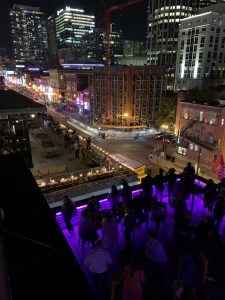
Although the opening night party had logistical problems, the closing party brought attendees to downtown Nashville for music, barbecue and rooftop views.
Another factor that no doubt affected people’s feeling about the conference was the opening night reception. Given Clio’s track record of consistently throwing the best bashes in legal tech, this was a disappointment. Held at the Grand Ole Opry, people arrived to a chaotic scene, with attendees unsure of what was going on and those typically ubiquitous Clio staffers nowhere to be found.
With the doors to the Opry locked, attendees were confused as to what they were supposed to do or even whether they would be let in at some point. Seeing a long line queued up to the Opry’s locked front door, I walked over and asked someone what they were all waiting for. “I have no idea,” she said.
Meanwhile, the courtyard in front of the Opry was a scene of hundreds of people restlessly queued up in any of a dozen or so long, long lines, waiting to get to one of the bars for a drink or food trucks for something to eat. The wait for a drink was 30-45 minutes, only to then have to get into another 30-45 minute food truck line. To get a drink and a taco took 90 minutes – 90 minutes that could have been spent networking and socializing.
There was no music playing or entertainment of any sort, just lots of people looking confused. Many – myself among them – eventually left and returned to the Gaylord in the hope of scoring something to eat. Those who remained at the Opry were eventually treated to a country music show that was, by all accounts of those who attended, great entertainment.
Other Issues
So between the venue and the miscalculated logistics of the opening night reception, the conference already had two strikes against it. (In fairness to Clio, someone told me that the logistical miscue was the fault of the host, not of Clio.)
But there were other possible causes. Of the people I spoke to who said the conference felt off to them, some offered additional thoughts.
A critique I heard from several people was that the conference felt more pitchy than in the past. One lawyer who was a first-time attendee, for example, said he felt as if too much of the conference was an attempt to sell him products – whether Clio’s or those of Clio’s partners.
In my past years’ write-ups of the conference, I have praised Clio for staging a conference that is not just for Clio customers, but for anyone with an interest in learning more about tech and innovation in law practice. In fact, for many years, Clio drew a bright line between programming designed for its customers and programming designed for that broader audience, with separate tracks for the two.
This year, Clio or its ecosystem partners seemed to have a presence at virtually every session. At many of the sessions, at least one of the speakers was a Clio employee. As I have already said above, and as I heard from many attendees, there was excellent programming. But it did feel more conspicuously to be a Clio customer conference than it had in past years and less a general legal industry conference.
Something else I heard repeatedly is that the sense of community that has permeated past years’ conferences was less palpable this year.
As I noted earlier, in my write-up on the 2019 conference, I called it a “cult of innovation.” And as I also previously noted, CEO Jack Newton described it as a tribe.
While that remained true this year, I did feel that the sense of it as a tribe was less pervasive, less palpable. Whether that was due entirely to the venue or to something more, I do not know.
Suggestions
Let me be clear: I still think this is the best conference in legal tech. And, as I already said, virtually everyone I spoke to who attends other legal tech conferences agreed.
Frankly, I was thrilled to spend these two days at ClioCon with so many people who, as Newton said, share a common goal of transforming the legal experience for all. This is not just Clio’s tribe – it is my tribe and that of many others. I draw energy and inspiration from being among them.
To the extent this was an “off night” for team ClioCon, I suspect it was an anomaly. Personally, I am not thrilled that the conference is returning to Nashville next year, only because I so disliked the venue, but there is no question that, wherever ClioCon goes, I will follow – and that I will be excited to be there.
I hope that some of my comments can prove to be constructive in designing next year’s conference. And I hope that I have not been so negative that they turn me away at the door. The truth is – and this is a strange thing for a journalist to say – I care about this conference and the people who work so hard to make it happen, and I want each year’s version to be better than the last.
I have spent way too much time in this post conjecturing why this conference felt “off” this year. Rather than end on that note, let me offer some thoughts on how, given the same venue, the conference could be even better next year.
- Reconfigure the registration area. The main registration area was a cavernous room that discouraged gatherings (other than an area of seating for speakers). It was a giant room to move through rather than to meet in. I would suggest finding a way to redesign it to make it more of a social hub.
- Reconfigure the overall conference area. Truthfully, I have no idea if this can be done with such a large conference, but the overall conference space felt too spread out this year, with lots of walking from place to place – often through that aforementioned registration area – and too little sense of connection among the spaces.
- Relocate the Launch//Code pitches. The pitches were in the exhibit hall, which made sense from the point of view of pulling traffic into the hall. But the acoustics were rough. Either keep it there with better acoustics or move it to a separate location.
- Decide if you are a user conference or industry conference. Clio has every right to make its conference a customer conference. But I think it needs to more clearly communicate which way it is going on this.
- Staff the parties. Far be it for me to tell Clio how to throw a party. Its parties have been among the most memorable I’ve ever attended. But it is possible that the disorganization of the Grand Ole Opry party could have been minimized by having more Clio staff on site. Remember those Clions-as-concierges I described above? It was hard to find anyone in the early hours of the Opry event who seemed in charge.
Grand Expectations
With ClioCon, Clio faces a daunting challenge. As it raises the bar each year – even with its virtual conferences during the pandemic – it then has to surpass that bar the next year. And with that raising of the bar each year comes higher and higher expectations among attendees.
As a reporter, I would be turning a blind eye if I said this conference was perfect in every way. I have taken the space to talk about the ways it felt off this year because that was what I so often heard from others.
But even when slightly off its A-game, the Clio Cloud Conference is still one of the best, if not the best, conference in legal tech. It was a must-attend before and it remains a must-attend today. So head on over and buy your tickets now.
 Robert Ambrogi Blog
Robert Ambrogi Blog